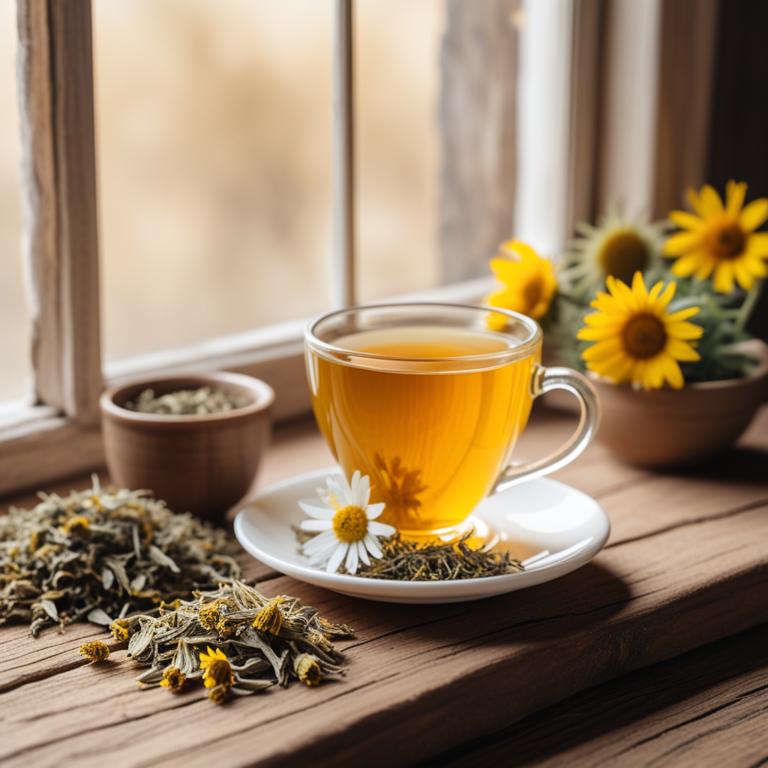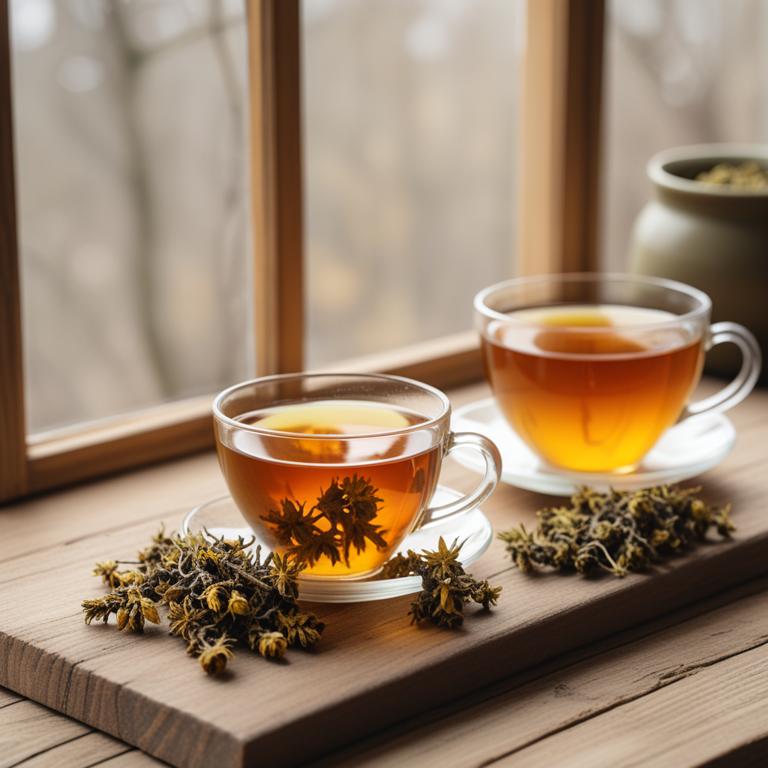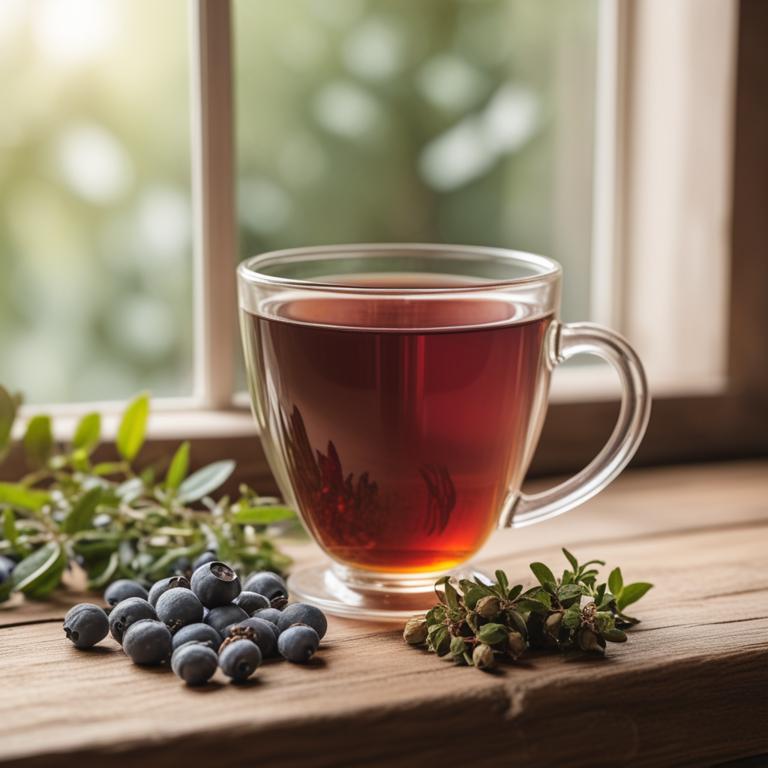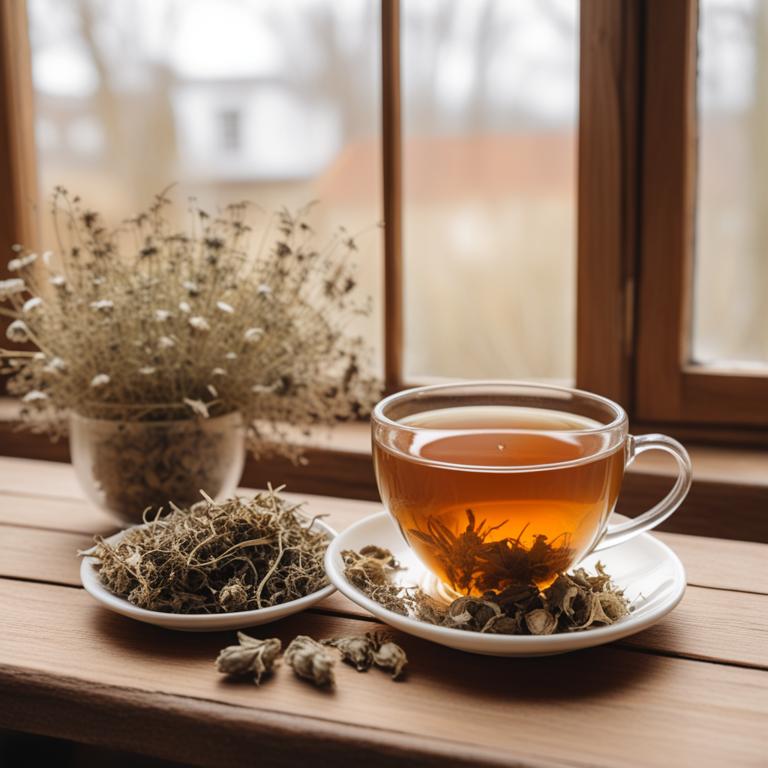10 Herbal Teas For Bruises

If you've ever had a bruise, you know how painful and unsightly they can be.
But did you know that certain herbal teas can help relieve the discomfort and promote healing?. Herbal teas, like those made from Arnica montana, Aloe barbadensis, and Calendula officinalis, contain anti-inflammatory and antiseptic properties that can reduce swelling and promote blood flow to the affected area. Arnica montana, for example, has been traditionally used to treat bruises and wounds due to its ability to reduce inflammation and promote healing. The tea made from this herb can be applied topically or consumed internally to help alleviate pain and promote the body's natural healing process. Similarly, Aloe barbadensis is known for its soothing and anti-inflammatory properties, which can help calm the skin and reduce the appearance of bruises.
Calendula officinalis, also known as pot marigold, is another herb that has been used for centuries to treat wounds and bruises. The tea made from this herb contains antiseptic and anti-inflammatory properties that can help prevent infection and promote healing. When consumed internally or applied topically, Calendula officinalis tea can help reduce swelling and promote the body's natural healing process. Using herbal teas for bruises can bring several benefits to your life. Not only can they help alleviate pain and promote healing, but they can also reduce the risk of infection and promote overall health and well-being. Additionally, many herbal teas are free from harsh chemicals and artificial ingredients, making them a great alternative to over-the-counter pain relievers.
By incorporating herbal teas into your daily routine, you can take a more natural approach to managing bruises and promoting overall health.
- 1. Arnica montana
- 2. Aloe barbadensis
- 3. Calendula officinalis
- 4. Hypericum perforatum
- 5. Hamamelis virginiana
- 6. Vaccinium myrtillus
- 7. Symphytum officinale
- 8. Echinacea purpurea
- 9. Ginkgo biloba
- 10. Taraxacum officinale
1. Arnica montana

Arnica montana teas contains bioactive constituents like flavonoids, phenolic acids, and sesquiterpene lactones, which contribute to its healing properties.
The sesquiterpene lactones, particularly helenalin and dihydrohelenalin, are responsible for Arnica's anti-inflammatory effects. These compounds help reduce swelling and pain associated with bruises by inhibiting the production of pro-inflammatory enzymes. The antioxidants in Arnica montana teas, including flavonoids and phenolic acids, also help protect against oxidative stress and promote tissue repair.
By reducing inflammation and promoting healing, Arnica montana teas can aid in the recovery of bruises.
- Gather 1 cup of fresh Arnica montana flowers or 1 tablespoon of dried Arnica montana flowers.
- Boil 1 cup of water in a pot.
- Pour the boiling water over the Arnica montana flowers in a cup.
- Steep the mixture for 5-10 minutes, then strain it into another cup.
- Drink the Arnica montana tea 2-3 times a day to help reduce bruise inflammation.
2. Aloe barbadensis

Aloe barbadensis teas contains aloin, aloe-emodin, and barbaloin, which are its key bioactive constituents.
These compounds have anti-inflammatory and antioxidant properties that help reduce swelling and promote healing in bruises. The anthraquinones in aloe barbadensis, including aloin and aloe-emodin, have been shown to have anti-inflammatory effects by inhibiting the production of pro-inflammatory enzymes. The antioxidant properties of aloe barbadensis help protect the skin from oxidative stress and promote the removal of damaged cells, which can aid in the healing process of bruises.
By reducing inflammation and promoting healing, aloe barbadensis teas can help alleviate the appearance and discomfort associated with bruises.
- Wash your hands and the aloe plant thoroughly with soap and water.
- Cut off a 4-inch piece of the aloe plant's stem. Remove the spiny skin, and scoop out the clear gel inside.
- Measure 2 tablespoons of the aloe gel. Place it in a cup.
- Add 1 cup of boiling water to the cup with the aloe gel. Let it steep for 5-7 minutes.
- Strain the liquid and drink the aloe tea 2-3 times a day for 1-2 weeks to help reduce bruise swelling.
3. Calendula officinalis

Calendula officinalis teas contains flavonoids and triterpenoids, which are known for their anti-inflammatory properties.
These compounds help reduce swelling and pain in bruised areas by constricting blood vessels and preventing the release of histamine. The sesquiterpenes and carotenoids in Calendula officinalis teas also promote healing by improving blood circulation and collagen synthesis. This leads to faster repair of damaged tissue and a reduction in the severity of bruises.
Additionally, the antimicrobial properties of Calendula officinalis teas help prevent infection in injured areas, further aiding the healing process.
- Gather 1 cup of Calendula officinalis flowers and 2 cups of boiling water in a heat-resistant cup or teapot.
- Steep the Calendula flowers in the boiling water for 5-7 minutes.
- Strain the mixture through a cheesecloth or a fine-mesh sieve into a clean cup.
- Add 1 tablespoon of honey to the tea if desired for taste.
- Cool the tea to room temperature before applying it to the bruise with a clean cloth or cotton ball.
4. Hypericum perforatum

Hypericum perforatum teas contains bioactive constituents like flavonoids, tannins, and phenolic acids.
These compounds have anti-inflammatory and antioxidant properties, which help to reduce swelling and pain in bruises. The flavonoids, particularly hyperforin and hypericin, have been shown to inhibit the production of pro-inflammatory enzymes, which contribute to bruising and swelling. Additionally, the antioxidants in Hypericum perforatum teas help to neutralize free radicals that can damage tissues and prolong the healing process.
By reducing inflammation and promoting antioxidant activity, Hypericum perforatum teas can help to alleviate bruising and promote faster recovery.
- Gather 1 cup of fresh Hypericum perforatum flowers and leaves.
- Dry the Hypericum perforatum flowers and leaves in a low-temperature oven or with a food dehydrator.
- Measure 1 tablespoon of dried Hypericum perforatum flowers and leaves into a tea infuser.
- Steep the Hypericum perforatum mixture in 1 cup of boiling water for 5-7 minutes.
- Strain and drink the tea 2-3 times a day to help with bruising and inflammation.
5. Hamamelis virginiana

Hamamelis virginiana teas contains bioactive constituents like tannins and flavonoids.
These compounds have anti-inflammatory and antioxidant properties, which help reduce swelling and promote healing in bruises. The tannins in Hamamelis virginiana teas constrict blood vessels and stop bleeding, while the flavonoids neutralize free radicals that can damage tissue. The anti-inflammatory properties of Hamamelis virginiana teas also reduce pain and discomfort associated with bruises.
By reducing inflammation and promoting healing, Hamamelis virginiana teas can help bruises recover more quickly.
- Gather 2 tablespoons of Hamamelis virginiana dried leaves and flowers.
- Add 1 cup of boiling water to a heat-resistant cup.
- Pour the dried Hamamelis virginiana leaves and flowers into the cup.
- Steep for 5-7 minutes, then strain the liquid into another cup.
- Drink 1-2 cups of the tea 2-3 times a day to help reduce bruise inflammation.
6. Vaccinium myrtillus

Vaccinium myrtillus teas contains anthocyanins, flavonoids, and phenolic acids as its bioactive constituents.
These compounds have anti-inflammatory and antioxidant properties, which help to reduce swelling and promote healing in bruises. Anthocyanins, in particular, are known for their ability to inhibit the production of pro-inflammatory enzymes, which contribute to bruise formation. The antioxidant properties of Vaccinium myrtillus teas also help to protect against oxidative stress, which can exacerbate bruising and delay recovery.
By reducing inflammation and promoting healing, Vaccinium myrtillus teas may help to alleviate the appearance and discomfort of bruises.
- Gather 1 cup of fresh Vaccinium myrtillus (blueberry) leaves, or 2 teaspoons of dried leaves.
- Combine the leaves with 1 cup of boiling water in a heat-resistant cup.
- Let the mixture steep for 5-7 minutes, then strain it using a fine-mesh sieve or cheesecloth.
- Discard the solids and let the tea cool to a comfortable temperature.
- Drink 1/2 cup of the tea, 2-3 times a day, to help reduce bruise swelling and promote healing.
7. Symphytum officinale

Symphytum officinale teas contains a rich combination of bioactive constituents, including allantoin, aucubin, and symphytine.
These compounds have anti-inflammatory and soothing properties, which help to reduce swelling and promote healing in bruised areas. The allantoin in Symphytum officinale teas acts as a cell proliferator, encouraging the growth of new tissue and speeding up the repair process. The aucubin and symphytine in the tea have a numbing effect, which can help to reduce pain and discomfort associated with bruises.
By reducing inflammation and promoting healing, Symphytum officinale teas can help to alleviate the symptoms of bruising and support the body's natural recovery process.
- Gather 2 teaspoons of dried Symphytum officinale (comfrey) leaves and flowers.
- Heat 1 cup of water until it boils.
- Add the comfrey leaves and flowers to the boiling water.
- Reduce heat and let it steep for 5-7 minutes.
- Strain the tea and drink 1/2 cup, 2-3 times a day for bruise relief.
8. Echinacea purpurea

Echinacea purpurea teas contains bioactive constituents like alkylamides, glycosides, and phenolic acids.
These compounds have anti-inflammatory and antioxidant properties, which help reduce swelling and promote healing in bruises. The alkylamides in Echinacea purpurea have been shown to inhibit the production of pro-inflammatory enzymes, while the glycosides have antioxidant properties that neutralize free radicals. The phenolic acids in Echinacea purpurea have been found to have anti-inflammatory and antimicrobial properties, which can help prevent infection and promote wound healing.
By reducing inflammation and promoting healing, Echinacea purpurea teas may help bruises to heal faster and with less scarring.
- Gather 2 tablespoons of dried Echinacea purpurea flowers and 1 teaspoon of dried lemon balm.
- Measure 1 cup of boiling water and let it cool for 1 minute.
- Combine the Echinacea flowers, lemon balm, and boiling water in a cup.
- Steep for 5-7 minutes, then strain the tea with a fine-mesh sieve or cheesecloth.
- Drink the tea 2-3 times a day to help reduce bruise swelling and discomfort.
9. Ginkgo biloba

Ginkgo biloba teas contains bioactive constituents like flavonoids, terpenoids, and bilobalide.
These compounds have anti-inflammatory and antioxidant properties that can help reduce swelling and promote healing in bruises. The flavonoids, particularly quercetin and kaempferol, have potent antioxidant effects that can neutralize free radicals and prevent further damage to the affected area. The terpenoids, such as ginkgolides A and B, can inhibit platelet-activating factor, which helps to reduce inflammation and bleeding in bruises.
By reducing swelling and promoting healing, Ginkgo biloba teas can help alleviate the discomfort and discoloration associated with bruises.
- Gather 1 teaspoon of dried Ginkgo biloba leaves, 1 cup of boiling water, and a tea infuser or strainer.
- Place the Ginkgo biloba leaves in the tea infuser or strainer.
- Pour the boiling water over the Ginkgo biloba leaves and let it steep for 5-7 minutes.
- Strain the tea into a cup and discard the leaves.
- Drink 1-2 cups of the Ginkgo biloba tea 2-3 times a day to help reduce bruising.
10. Taraxacum officinale

Taraxacum officinale teas contains bioactive constituents like flavonoids and phenolic acids.
These compounds have anti-inflammatory and antioxidant properties that help reduce swelling and promote healing in bruises. Flavonoids, specifically, have been shown to inhibit the production of pro-inflammatory enzymes, which can contribute to bruise severity. The antioxidant properties of phenolic acids help protect damaged cells from further harm, promoting a faster recovery process.
By reducing inflammation and oxidative stress, Taraxacum officinale teas can help alleviate bruise symptoms and support the body's natural healing process.
- Gather 1 cup of fresh Taraxacum officinale leaves and flowers.
- Steep 2 tablespoons of the Taraxacum officinale in 1 cup of boiling water for 5-7 minutes.
- Strain the liquid and discard the solids.
- Add 1 tablespoon of honey to the tea, if desired, to sweeten it.
- Drink the tea 2-3 times a day to help reduce bruise swelling and pain.